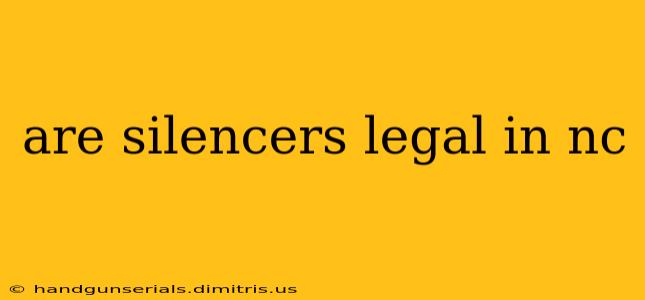The legality of firearm silencers, often called suppressors, in North Carolina can be confusing. This guide aims to clarify the current laws and regulations surrounding suppressor ownership and use within the state. Understanding these laws is crucial for responsible gun ownership.
North Carolina Suppressor Laws: The Basics
North Carolina allows the possession and use of firearm silencers, but under strict regulations. This means it's not a simple "yes" or "no" answer; compliance requires understanding the specific legal requirements. These requirements primarily involve registration and adherence to federal laws.
Federal Regulations: The NFA's Impact
Before diving into state-specific laws, it's essential to acknowledge the significant role of federal regulations. The National Firearms Act (NFA) of 1934 governs the manufacture, sale, possession, and transfer of certain firearm accessories, including silencers. The NFA mandates registration of suppressors with the Bureau of Alcohol, Tobacco, Firearms and Explosives (ATF). This federal registration is a prerequisite for legal ownership in North Carolina, or any other state.
State-Level Requirements: Registration and Permits
While North Carolina doesn't prohibit silencers outright, it aligns with federal regulations, requiring adherence to the NFA's registration process. There are no additional state-level permits or licenses specifically for suppressors beyond what's mandated by the ATF. This means you must go through the federal process to legally own a silencer in North Carolina.
The Process of Legally Owning a Suppressor in NC
The process involves several steps and can take time:
-
ATF Form 1 or Form 4: You'll need to complete either ATF Form 1 (for making your own suppressor) or ATF Form 4 (for purchasing a suppressor from a licensed dealer). Form 4 is the more common route for most individuals.
-
Background Check: A thorough background check is conducted by the ATF as part of the application process. This is the same background check required for purchasing firearms from a licensed dealer.
-
Tax Stamp: A significant tax is associated with registering a suppressor under the NFA. This tax must be paid before the ATF approves your application.
-
Waiting Period: Expect a considerable waiting period, often several months, for the ATF to process your application and issue the necessary approval.
-
Storage and Transportation: Once approved, you'll need to store and transport your suppressor according to all applicable federal and state laws.
Common Misconceptions about Silencers in North Carolina
-
"Silencers make guns silent": This is a common misconception. Suppressors significantly reduce the sound of a gunshot, but they don't eliminate it entirely.
-
"Silencers are only for criminals": Law-abiding citizens utilize suppressors for various reasons, including hearing protection, reduced recoil, and wildlife hunting.
-
"Silencers are automatically illegal": This is incorrect; they are legal in NC under strict federal and state guidelines.
Responsible Ownership: Key Considerations
Even with legal ownership, responsible handling and use are paramount. Always familiarize yourself with all applicable local, state, and federal laws regarding firearm ownership and usage before acquiring a suppressor.

